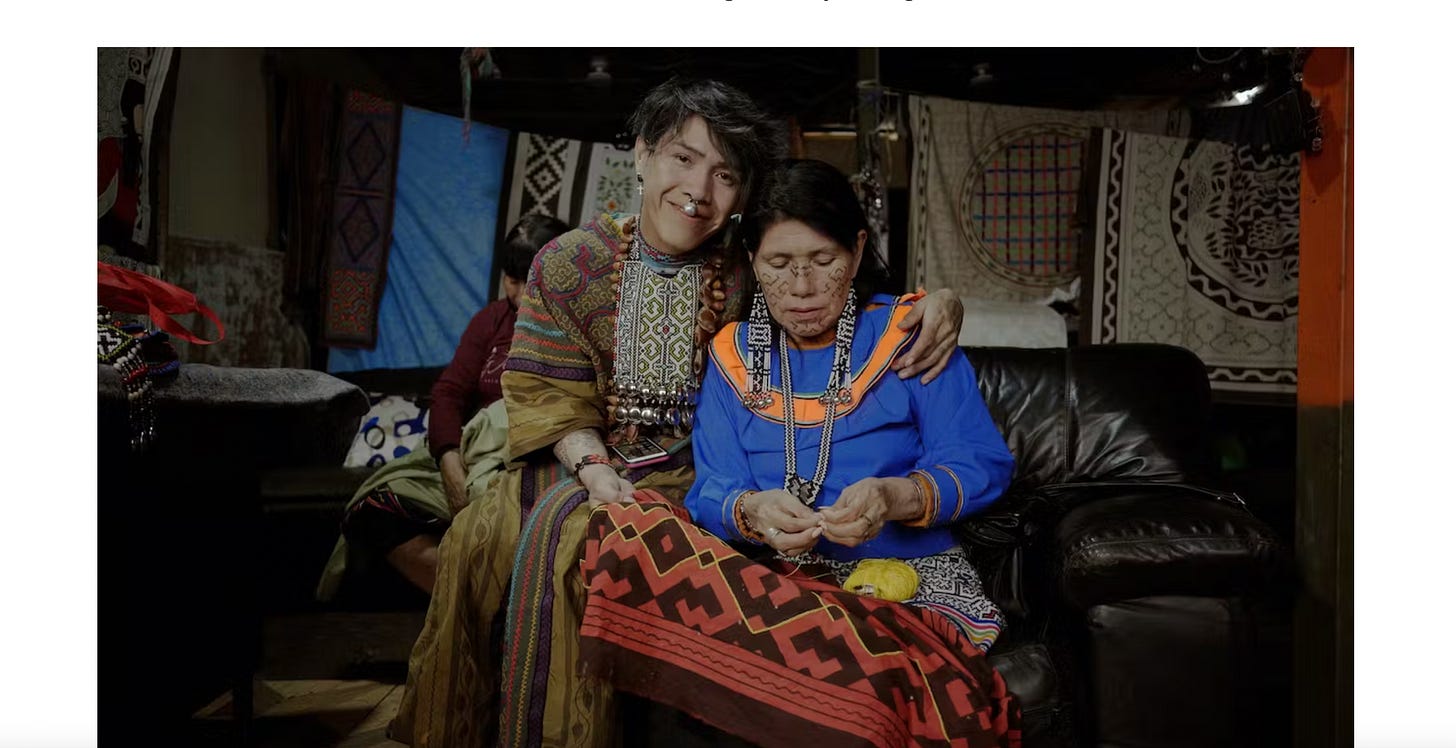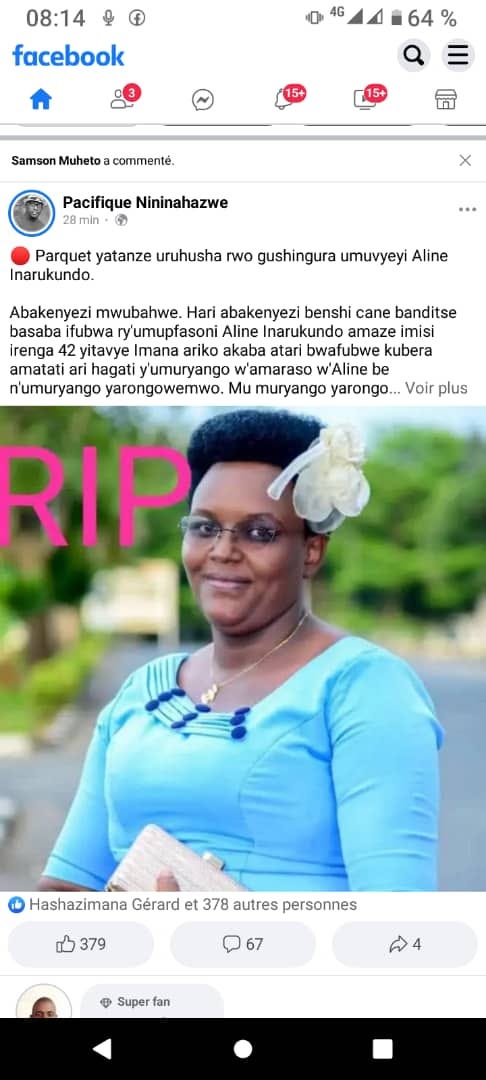Global Roundup: Peru Indigenous Artist & Leader, Femicide in Burundi, Bangladesh Trans Activist, Fighting Period Poverty in Lebanon, Queer Boxing Club
Curated by FG Contributor Samiha Hossain
“My son Roné is studying communication. He is not ashamed of his identify. He sits in class wearing his cushma, a traditional cotton tunic. He likes it. I tell him, “You have to be proud of what and who you are,” Olinda Silvano, seen here with her son. Photo by ©A. Aguilar ILO/OIT
I am an artist, a muralist, an activist, and a painter. I give lectures, tell stories, and teach workshops. I am a singer as well. I am a woman of a thousand trades. -Olinda Silvano
Like her father, Silvano is now also a leader in the Shipibo-Konibo community in Cantagallo, representing an association of 238 families. The community has been trying to get a property title to the land but they have been told that it is contaminated land and to get out. They face unreliable running water and electricity.
Here in the capital, we don't have farms or our cassava and plantains. We don’t have a river full of fish. Everything is about money. For everything you eat, you need money. So, we make a living with our art, our Kené designs, which is the art form of the Shipibo-Konibo people. -Olinda Silvano
Silvano aims to empower indigenous men and women so they feel valuable. Since she became a leader, the community has an infirmary. They also have a community kitchen and a craft shop where women sell their handicrafts to tourists. She has also helped the community by defending and claiming their rights in different places, travelling to other countries, participating in meetings and painting murals.
The pandemic was a challenging time, as people could not sell their crafts. With the help of her son, Silvano started using Facebook, Instagram and Zoom to help spread the community’s art, take photos, make videos and teach others about Amazonian designs.
I love Cantagallo and I love Peru. I am happy to be a Peruvian indigenous woman. I am doing my job, creating my art, and making my country proud. -Olinda Silvano
Silvano wants to feel like her community belongs to the country. She asks for the Ministry of Housing to protect Cantagallo, so that it can be considered part of the nation’s cultural patrimony.
Aline Inarukondo was killed on 21 January, 2023. Family disputes over the arrest of her husband for the crime meant she was only buried 47 days later.
Aline Inarukundo died in Bujumbura on March 7th but her body was kept in the morgue for 47 days. The delayed burial was the result of a tug of war between her in-laws and her blood relatives over the imprisonment of her husband, Claude Arakaza, who is suspected of murdering her. Aline’s in-laws dispute that it was a femicide and asked for an autopsy to be conducted outside the country, presumably so that the cause of death could be independently verified. They have demanded the release of her husband, even as murder investigations are still underway. Concerned family, friends, and former colleagues of Aline, as well as women rights activists, launched a protest campaign on March 2nd, demanding that she be buried with dignity.
Fidella, 38 (her name has been changed to protect her identity), reports that Aline’s death occurred while she was planning to initiate the divorce process. Aline’s family knew she was in danger and the police have intervened before, as her husband abused her, according to Fidella.
The Seruka Center, a local NGO dedicated to assisting victims of gender-based violence, has recorded 241 cases of rape victims from December 2022 to the end of February 2023. It also assisted 38 victims (including 37 women) of physical, emotional, and economic violence. Burundi is a highly patriarchal society in which only 17.7% of women, who constitute the majority of the population, have access to land, the main source of income. The social norms make women afraid to denounce the violence that happens to them, for fear of being stigmatized in society and being considered deviants.
Whenever a man beats, injures, or breaks his wife’s arm or leg in Burundi, he is only punished by being advised not to repeat the act. As for the victim, her mother, older sisters, and aunts advise her to keep it a secret so as not to tarnish her couple’s image explaining to her ‘we too have always suffered the same thing.’ -Inés Kidasharira, women’s rights journalist
According to Kidasharira, women, especially rural women, do not know of the laws that exist to protect them against physical, moral, and economic violence. And for those who do know, the problem of lack of access to resources prevents them from enjoying their rights. She warns that intimate partner violence is fast becoming normalised as men who kill their spouses go unpunished.
While Burundi’s law on gender-based violence was passed in 2016, women’s rights organizations are pushing for its amendment. They criticize it for not being adapted to the current situation and for its lack of clarity. Kidasharira decries the lack of government commitment to combating these violent crimes. She finds it inconceivable that the government does not adopt necessary measures to address this growing issue.
Photo Credit: Desmond Picotte for The New York Times
In 2021, Tashnuva Anan Shishir made history as the first transgender news anchor in Bangladesh and now she has been spending time in New York pursuing her dreams. Last year, she became the first transgender model from Bangladesh to walk in New York Fashion Week. Now, she is playing the character “Shou” for the bilingual play “Public Obscenities,” about a couple who interviews queer locals in Kolkata, India. Shou identifies as kothi, an Indian gender that encompasses a breadth of expressions.
Anan says that being in New York has been valuable for her especially as an activist. In Bangladesh, she was working on a national level but now she feels she can contribute internationally.
For myself, that I believe: Do your own job. Just do hard work. There is no shortcut in life. Just believe in yourself. And just, first, inspire yourself. I have competition only with myself, because I’m trying to do a little bit better than yesterday. -Tashnuva Anan Shishir
Anan believes that Shou has been memorable to audiences because she knows about the situation of queer people and queer activism, especially in Kolkata, Bangladesh and Pakistan. In addition, Shou’s femininity makes her relatable to the South Asian queer community, according to Anan. The play has deeply resonated with South Asian audiences, says Anan. She recounts how a girl in the audience was crying and said to her, “this is the story that we know but we couldn’t tell in front of people.”
Anan is looking for opportunities to act more and hopes to jump into another project after her current one is complete. She wants to continue to play powerful characters that we do not often see portrayed. Ultimately, she dreams of performing on Broadway or in a Hollywood film one day.
Hiba Mohammad Hussein, 34, helps to raise awareness on reproductive health through her work with Roof and Roots. Photo: UN Women/Lauren Rooney
In Lebanon, where worsening economic conditions have hit women and girls hard, period poverty is on the rise. The Lebanese social enterprise Roof and Roots has been working to address this problem on two fronts, training and employing local women to manufacture and distribute affordable menstrual products.
With locations in Jabal Mohsen, Tripoli and Saida, Beirut, the organization also facilitates discussions and educational sessions with women and girls, helping to break taboos around menstruation and reproductive health. By March 2022, the team had produced an initial batch of 13,500 packs of products, selling them door-to-door and distributing a percentage of revenue to vulnerable women in the area.
Tripoli locals Hiba Mohammad Hussein, 34, and Itab Bayoud, 46, have both faced period poverty and menstrual stigma in their own lives. Now working with Roof and Roots, they are helping to ensure other women and girls do not have the same experiences.
Hussein, a mother of two, has been her family’s main provider since her husband was injured in a military clash in 2015. She used to work as a driving instructor, until the increasing price of fuel made it too difficult to make ends meet. She began working with Roof and Roots in 2021. She says that in many parts of the country menstruators are still bound by norms and harmful traditions that perpetuate inaccurate information about menstruation. Through Roof and Roots, she has been able to provide health awareness sessions to women across generations, to adult women and to young girls who are beginning to speak up and correct misconceptions about menstruation.
We need to create safe spaces for adolescent girls to discuss their reproductive health with experts, to allow them to properly discover their bodies and understand the physical and hormonal changes they experience. It is about time for girls to stop being scared whenever they get their periods, and for them to understand how to deal with it. -Hiba Mohammad Hussein
Bayoud, a mother of four, has dedicated her life to caring for her family. Determined to gain financial independence and help make ends meet, she took a job with Roof and Roots. She shares her personal experience with the economic crisis and how it negatively affected her and her daughters’ menstrual health. She believes in raising boys and girls into believing that women’s reproductive health is not taboo or something to be ashamed of.
I am aware of the stigma around menstruation and women’s reproductive health. As I worked on manufacturing the sanitary pads, I became much more mindful of period poverty and how it was affecting many women. Unfortunately, most of them are too afraid to speak about it because it is deemed shameful. -Itab Bayoud
Via Pink News
Members of Knockout LGBTQ+ Boxing Club meet three times a week, for classes that embrace people of all genders, sexualities and abilities in London, UK. Outside of the gym, the club gives queer people a chance to make friends with others in their community.
We try to offer an opportunity to people who have never boxed before to discover the sport because, let’s be honest, a lot of boxing spaces are a little bit homophobic and transphobic. -Pierre Gouverneur, co-chairperson of Knockout LGBTQ+ Boxing
The goal is to create a space for London’s LGBTQ+ community to come together and enjoy sport in an inclusive, welcoming environment. The focus is not on ability – it is not about being the best or about creating a pathway for boxers to win Olympic medals.
Knockout recently surveyed its members and found that most of their members joined to meet other LGBTQ+ people, proving just how vital queer spaces that do not centre around alcohol really are. Of those surveyed, 82% of Knockout members said they went to classes to meet other queer people. 55% said they joined so they could learn how to box in a safe space, while 52% said it was to improve their health and fitness. An additional 14% of members said they had joined Knockout to learn how to defend themselves.
Gouverneur knows first-hand the importance of learning boxing in a safe and judgement-free environment. He has been boxing for 10 years, but he recalls feeling he was “too femme” for sport as a child. It was not until he went to a boxing club run by a queer woman that his vision of what a sporting club could look like started to shift.
The reality is being queer-friendly takes more than saying, ‘We welcome queer people’. It takes a real effort to decide what happens if there’s a homophobic or transphobic incident. Just saying your space welcomes queer people isn’t enough. There’s so much work that needs to happen to make sure queer people feel safe to participate in sport. -Pierre Gouverneur
Samiha Hossain (she/her) is a student at the University of Ottawa. She has experience working with survivors of sexual violence in her community, as well as conducting research on gender-based violence. A lot of her time is spent learning about and critically engaging with intersectional feminism, transformative justice and disability justice.
Samiha firmly believes in the power of connecting with people and listening to their stories to create solidarity and heal as a community. She refuses to let anyone thwart her imagination when it comes to envisioning a radically different future full of care webs, nurturance and collective liberation.






